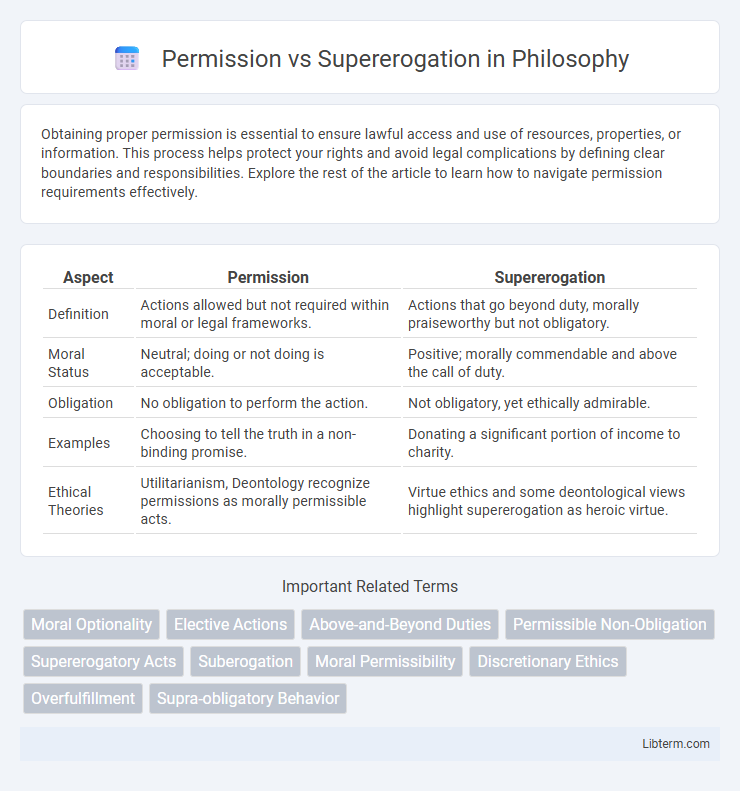Obtaining proper permission is essential to ensure lawful access and use of resources, properties, or information. This process helps protect your rights and avoid legal complications by defining clear boundaries and responsibilities. Explore the rest of the article to learn how to navigate permission requirements effectively.
Table of Comparison
| Aspect | Permission | Supererogation |
|---|---|---|
| Definition | Actions allowed but not required within moral or legal frameworks. | Actions that go beyond duty, morally praiseworthy but not obligatory. |
| Moral Status | Neutral; doing or not doing is acceptable. | Positive; morally commendable and above the call of duty. |
| Obligation | No obligation to perform the action. | Not obligatory, yet ethically admirable. |
| Examples | Choosing to tell the truth in a non-binding promise. | Donating a significant portion of income to charity. |
| Ethical Theories | Utilitarianism, Deontology recognize permissions as morally permissible acts. | Virtue ethics and some deontological views highlight supererogation as heroic virtue. |
Understanding Permission: Definition and Scope
Permission refers to the explicit or implicit authorization granted to perform an action within ethical, legal, or social boundaries, defining what is allowed rather than what is obligatory. Its scope encompasses various contexts, including moral philosophy, legal systems, and everyday social interactions, where it delineates permissible behavior without imposing a duty. Understanding permission is crucial for distinguishing actions that are allowed from those that are morally required or praiseworthy, especially when contrasted with concepts like supererogation.
What is Supererogation? Key Concepts
Supererogation refers to actions that go beyond what is morally required, involving acts of kindness or charity that are commendable but not obligatory. Key concepts include the voluntary nature of these actions, moral praise without blame for omission, and the distinction from both duty and permission, as supererogatory acts exceed moral duty rather than simply being allowed. This concept is significant in ethical theory because it expands the understanding of moral goodness beyond strict obligations.
Historical Perspectives on Permission and Supererogation
Historical perspectives on permission and supererogation reveal divergent views within ethical theories, particularly in classical and medieval philosophy. Early philosophers such as Aristotle regarded permission as actions falling within the moral minimum, while supererogatory acts--those going beyond duty--were praised but not required. Christian thinkers like Aquinas further developed supererogation, emphasizing voluntary acts exceeding obligatory commands, shaping moral theology and legal interpretations through centuries.
Moral Philosophy: Comparing Permission and Supererogation
Permission in moral philosophy refers to actions that are allowed or morally neutral, requiring no moral praise or blame, while supererogation denotes actions that go beyond duty, deserving moral commendation for their exceptional goodness. Unlike permissible acts that neither enhance nor diminish moral standing, supererogatory acts elevate moral status by voluntarily exceeding ethical obligations. The distinction highlights how moral frameworks evaluate ordinary permissibility differently from morally exemplary behavior that is praiseworthy but not mandatory.
Types of Actions: Permissible, Obligatory, and Supererogatory
Permissible actions are those allowed within moral or legal frameworks without obligation, while obligatory actions require adherence due to ethical or legal mandates. Supererogatory actions exceed the call of duty, offering morally commendable deeds without being mandatory. Understanding these distinctions clarifies how individuals navigate ethical decision-making and prioritize responsibilities.
Real-World Examples of Permission vs Supererogation
Permission allows individuals to engage in actions that are morally or legally allowed but not mandatory, such as driving within speed limits or taking a day off work. Supererogation refers to actions that go beyond duty or obligation, exemplified by donating a kidney to a stranger or volunteering extensively during a crisis. Real-world examples highlight the difference: while permission includes everyday choices like recycling or following laws, supererogatory acts involve exceptional generosity or heroism beyond standard expectations.
Ethical Theories: Deontology and Supererogatory Acts
Permission in deontological ethics defines actions allowed by moral duties but not required, distinguishing them from obligatory acts that uphold moral rules. Supererogation refers to acts that exceed duty, praised yet not demanded, embodying moral excellence beyond deontological obligations. These supererogatory acts challenge rigid duty-based frameworks by introducing morally commendable actions that are not strictly necessary, thus expanding the ethical evaluation within deontological theories.
Legal Perspectives: Permission vs Supererogatory Duties
Legal perspectives distinguish permission as actions allowed within established rules, whereas supererogation refers to morally praiseworthy acts beyond legal obligations. Permission grants individuals the right to engage in conduct without penalty, forming the baseline of lawful behavior. Supererogatory duties exceed legal requirements, reflecting ethical choices that, while commendable, are not enforceable by law.
Significance in Everyday Decision-Making
Permission allows individuals to act within accepted norms without moral obligation, providing flexibility in everyday choices such as social interactions or work tasks. Supererogation involves actions that go beyond duty or moral requirement, often enhancing social goodwill and personal integrity by contributing extra effort or kindness. Understanding the distinction helps people navigate ethical boundaries, balancing permissible behavior with opportunities for moral excellence in routine decisions.
The Debate: Where Should We Draw the Line?
Permission and supererogation represent distinct ethical categories, with permission allowing actions that are morally acceptable but not obligatory, while supererogation involves actions that go beyond duty and are morally praiseworthy. The debate centers on defining the boundary where permissible actions cease and supererogatory acts begin, highlighting challenges in moral philosophy regarding obligation and moral excellence. Philosophers argue about criteria such as moral cost, societal expectations, and individual capacity to delineate this line, impacting theories of moral responsibility and ethical decision-making.
Permission Infographic

 libterm.com
libterm.com